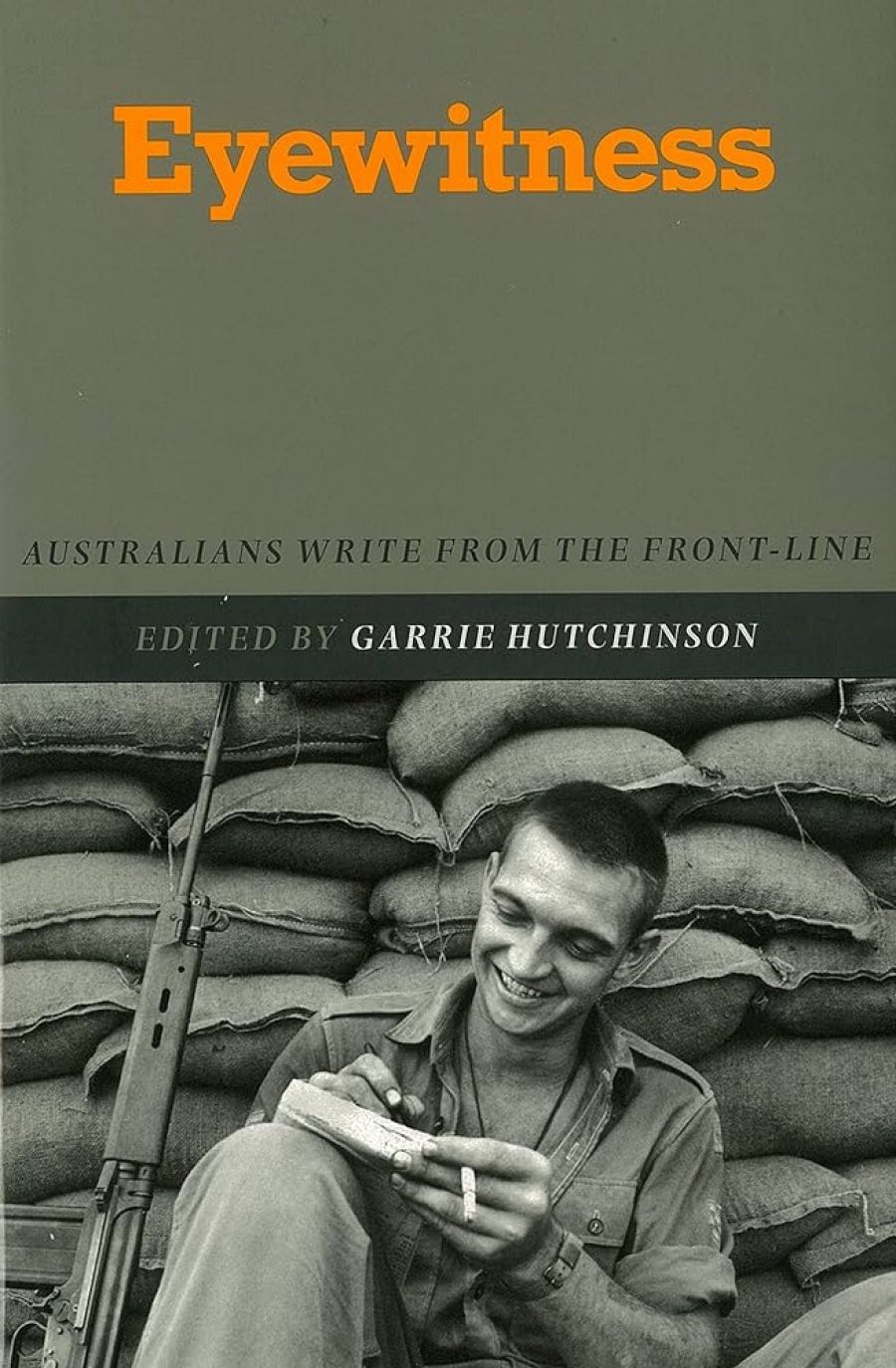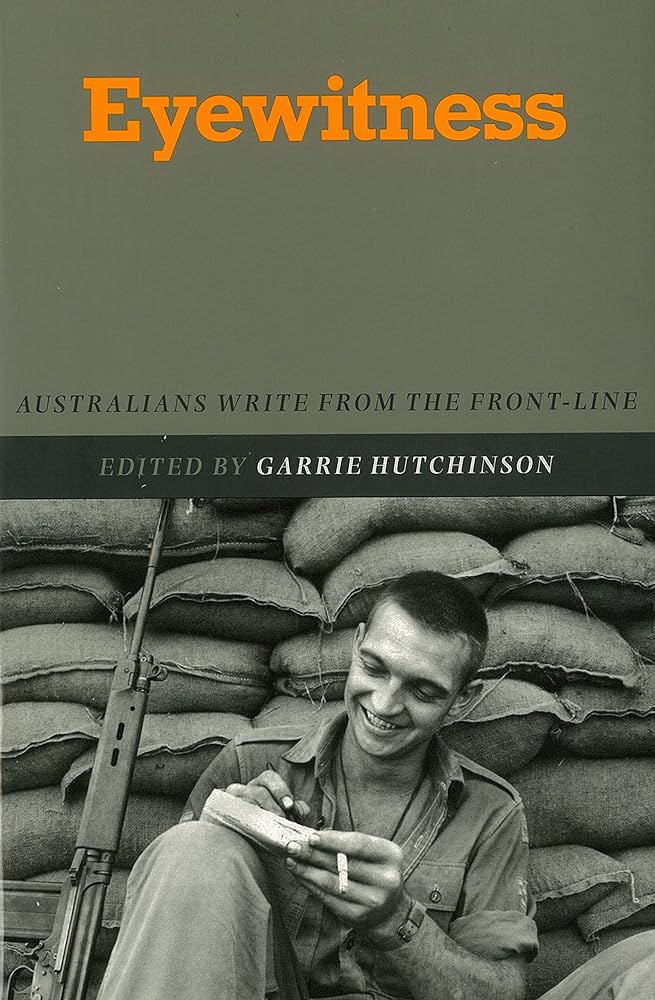
- Free Article: No
- Contents Category: Australian History
- Review Article: Yes
- Article Title: Memory is not enough
- Online Only: No
- Custom Highlight Text:
It is one of life’s ironies that war can bring out the best in people, and writers are no exception. Picture Australian seaman Ray Parkin as he toiled like a slave for the Japanese on the Thai–Burma railway during World War II. Despite the brutality and privations, Parkin felt that the experience would ‘not be entirely wasted’ if he could somehow get his diary and drawings home when it was all over. These were crucial, for, as he wrote, ‘Memory is not enough’. Parkin’s reflections go to the kernel of oral versus written memory, and why humans write in the first place: to make a record that can speak by itself, even when the writer is dead. His words could also serve as an appropriate epigraph to Eyewitness, a collection of diaries, memoirs, correspondents’ reports and analysis, all composed by Australians at ‘the front-line’ of wars and conflicts.
- Book 1 Title: Eyewitness
- Book 1 Subtitle: Australians write from the front-line
- Book 1 Biblio: Black Inc., $34.95 pb, 442 pp
- Book 1 Cover Small (400 x 600):

- Book 1 Cover (800 x 1200):

There have been other books of similar material, such as Pat Burgess’s Warco (1986), and Banjo’s Paterson’s Boer War dispatches, From the Front (2000). This collection, edited by Garrie Hutchinson, covers some of the same territory, but updates it to take in modern conflicts such as Iraq and Afghanistan, and expands the field of writers to include soldiers who participated in the conflicts, not just journalists who observed them. The various extracts aren’t simply military history or stories of derring-do. Rather, they concern the human condition, seen at its most intense, poignant and despicable.
Apart from Parkin’s, one of the iconic pieces in Eyewitness is Wilfred Burchett’s description of the ‘atomic plague’ of radiation sickness that meant the horror of the Hiroshima bomb became a continuing nightmare for survivors. ‘I write this as a warning to the world’, ran Burchett’s dramatic headline. Equally moving is Osmar White, groping for language to convey what he had witnessed at Buchenwald concentration camp in 1945, and finding a fitting phrase by describing Nazi Germany as ‘a diseased nation’.
White is also represented in the Pacific theatre, where he encapsulates the exhaustion the Australians faced on the Kokoda Track: ‘We had no fresh troops. At no stage did we ever have fresh troops.’ This extract also includes a moving portrait of renowned photographer Damien Parer, saying his regular nightly prayers in the middle of the madness that was the jungle war.
Parer’s devout faith makes an apposite contrast to the sardonic fatalism that is more commonly the soldier’s attitude. That is certainly how W.H. Downing saw things as he waited to go into battle at Fromelles, in 1916: ‘We neither knew nor cared what the morrow might bring. One accepts the immediate present in the army.’ And one accepts the joy, too, when it comes, as it did for Betty Jeffrey, in August 1945, after three and a half years’ brutal imprisonment by the Japanese. One of the few women in this collection, Jeffrey writes about the excitement of being able to enjoy simple domestic pleasures: fresh clothes, a cup of milk, a vegemite sandwich.
Many of the pieces in Eyewitness are already well known and widely available, but one of the gems that Hutchinson has brought to light is Geoffrey Tebbutt’s biting analysis of oil exploitation at Tarakan Island, Borneo. As the expatriate population waited for the inevitable Japanese invasion, Tebbutt reflected on the rapacious appetites of all the colonial powers. The oil of Tarakan, he wrote, ‘bought racehorses, yachts, mansions, mistresses; it had fattened tycoons in London, Amsterdam, New York; it lit Nippon eyes with ambition’. Tebbutt had covered the early part of the Pacific War for the Sydney Morning Herald and the Melbourne Herald, and wrote a book in 1943 based on his observations, but it was never published; a wartime climate was probably not the right place to point out that no one had the right to all the moral high ground.
Tebbutt’s complex political assessment was also at odds with the more common war genres of description and empathetic reporting. Eyewitness has examples of each, which are successful to varying degrees. G.H. Fearnside’s first-person account of the siege of Tobruk is certainly authentic, but the stilted prose is perhaps too great a reflection of the boredom faced by the ‘Rats’. Peter Ryan’s narrative of evading capture on New Guinea seems to be more about himself than about the larger situation. By contrast, Kenneth Slessor’s assured cadences elevate his writing above the workaday correspondents and accidental diarists who looked at the same things, but saw less.
The same issues of genre, ‘angle’ and audience continue for journalists writing about modern wars. Of all the accounts reprinted here, Irris Makler’s Our Woman in Kabul (2003) stands out for its terrific combination of description and analysis. Makler takes the trouble to provide a detailed historical background as to why the US was bombing the Taliban in Afghanistan in 2001. It was a classic case of ‘blowback’, she writes, a Frankenstein-like complex of foreign policy where a local despot is supported for short-term gain, only to turn around and bite the hand that fed them – think Saddam Hussein or Osama bin Laden. Makler describes how the US poured money and arms into Afghanistan in the 1980s to destabilise the Soviet Union. When that war was over, the Americans left ‘without a backward glance’. Now they are reaping the sour rewards, having helped train and arm the very Islamic fundamentalists who have become their own worst enemy. The Bible has a phrase for it: the wages of sin.
Like any collection, Eyewitness invites questions about which authors and texts are selected, what editorial strategies are employed, and what parameters guide the overall structure. And here there are a few problems. It seems a pity that Hutchinson has limited his selection to Australians’ experience of conflicts only from 1915 onwards, for this skews our understanding of Australia’s involvement in war and armed struggle. Apart from Banjo Paterson on the Boer War, this collection could have widened its ambit to include Raffaello Carboni on the Eureka Stockade, or Watkin Tench at Sydney Cove, each of whom was very much on ‘the front-line’. In terms of structural editing, Lindsay Murdoch’s series of reports from East Timor would have benefited from stronger intervention. As it is, when her originally separate reports are collected together, their impact is weakened by unnecessary overlap and repetition. There are also technical editing problems and plain mistakes in the editorial comment. For example, Eyewitness begins with an extract from the diary of the official Australian war correspondent Charles Bean covering the landing at Gallipoli on 25 April 1915. This extract was previously published in Kevin Fewster’s edition of Bean’s diary, Frontline Gallipoli (1983), and the text as it appears in Eyewitness includes Fewster’s editorial comments. Yet where Fewster carefully distinguished his own words in square brackets, here they appear in round brackets, as if they are Bean’s own parenthetic comment. Not a terrible crime I suppose, but over the years there has been a lot of careful critical work to identify the various stages of Bean’s diaries, and this sort of oversight muddies the waters.
The same carelessness is apparent in the introduction, where Hutchinson discusses Keith Murdoch’s infamous letter about Gallipoli. Hutchinson writes that it was printed as a state paper by David Lloyd George, ‘the English Prime Minister’. Calling Lloyd George the English prime minister is a double insult: he was of course Welsh and, while he later became prime minister of Great Britain (not England), he wasn’t at the time of Murdoch’s letter; it was in fact Herbert Asquith who requested the letter be printed.
Hutchinson would do more honour to his authors if he checked his facts more thoroughly. Memory, as Parkin knew, is not enough.


Comments powered by CComment